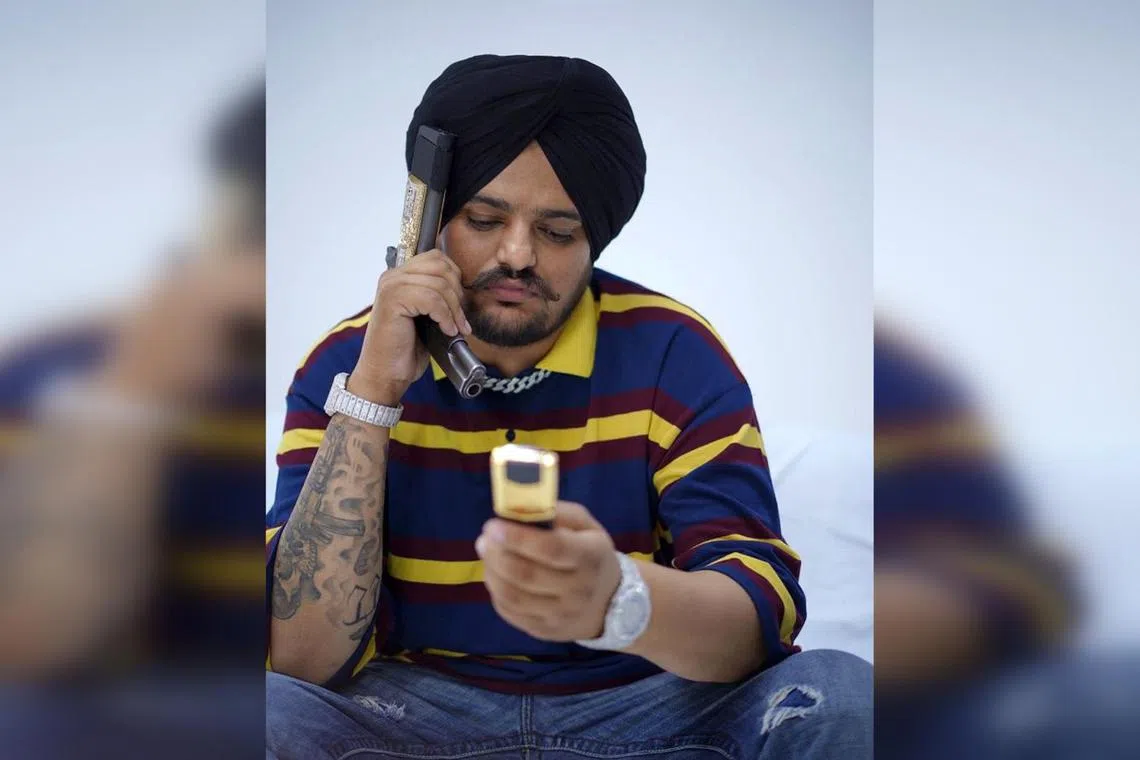Punjab makes renewed attempt to crack down on songs glorifying guns and violence
Sign up now: Get ST's newsletters delivered to your inbox

Pop singer-turned-politician Shubhdeep Singh Sidhu, better known as Sidhu Moose Wala, was shot dead by unknown assailants in Punjab’s Mansa district in May.
PHOTO: @ISIDHUMOOSEWALA/TWITTER
Follow topic:
NEW DELHI - “I have five bullets in my gun for your five brothers,” sings a young man padded up in a fashionable black leather jacket and brandishing a double-barrelled gun. It is a scene drawn from a music video
Another, with 24 million views,
Contemporary Punjabi music’s addiction to guns and violence, something these two hit songs illustrate, is back in the news.
On Nov 13, the Aam Aadmi Party’s state government in Punjab imposed a ban on songs promoting guns and violence, besides prohibiting weapons from being flaunted publicly and ordering a review of existing arms licences in the north Indian state.
This is not the first time the government has tried to deal with this rampant problem in a state where owning a gun is regarded as a status symbol by many, and pop songs frequently glorify gun culture, drugs and caste-based violence, besides sexually objectifying women.
In February 2020, the preceding Congress government had announced it would “not allow release of any movie/songs promoting gangsters and violence”.
While the state has around 2 per cent of India’s population, it has about 10 per cent of the country’s total gun licences, with nearly 400,000 active licences, according to one report. Such licence holders can procure guns from authorised dealers, but an illegal weapons industry has also flourished in Punjab, where celebratory firing at weddings and other occasions continues despite a ban.
“Punjabi people think weapons are part of their life and culture,” said Mr Panditrao Dharennavar, an assistant professor of sociology at a government college in Chandigarh.
He pointed out that the historic practice of wielding weapons by certain Sikh gurus, intended as “peaceful holy” tools to fight injustice and for self-defence, has been misinterpreted by many to defend the flaunting of modern-day weapons such as guns.
It is an argument that has been thrown back at him by Punjabi singers and others during his public campaigns since 2016 to sanitise Punjabi music and society.
“They will choose to glorify only guns, not the teachings of Guru Granth Sahib (Sikhism’s holy book) or Punjab’s rich tradition of Sufism,” Mr Dharennavar told The Straits Times.
In 2019, in response to a petition he had filed, the High Court of Punjab and Haryana ordered that no songs glorifying liquor, drugs and violence be played publicly, including in live shows.
With the problem still rampant, the government has been under pressure to act, especially after famous pop singer-turned-politician Shubhdeep Singh Sidhu, better known as Sidhu Moose Wala, was shot dead by unknown assailants in Punjab’s Mansa district in May. The 28-year-old had achieved both fame and notoriety for his songs eulogising gun culture.
Doctoral researchers Sumati Thusoo and Shivangi Deshwal noted in an article published in April in Economic & Political Weekly that Punjabi music’s violence-laced lyrics are deeply embedded in the state’s age-old structures of patriarchy and caste-based subjugation.
Also identifying misogyny as a dominant theme in Jatt-centric Punjabi music, they argued that the feudal and patriarchal mindset has not been challenged by “voices of resistance from women’s perspectives”.
It is a problem that the Green Revolution worsened in the 1960s, increasing Punjab’s agricultural yields as well as incomes massively, but marginalising women whose agrarian roles were displaced by machines. This, the scholars wrote, led to “an epidemic of… alcoholism, drug addiction and violence against women” that continues to plague Punjabi songs.
Dr Surjit Patar, a noted Punjabi poet and chairman of the Punjab Arts Council, said a commission to censor Punjabi songs and videos can be considered but is unlikely to work because of multiple challenges, including concerns about infringing artistes’ creativity.
“What can the Punjab government also do in cases where songs are recorded and broadcast from Delhi,” he added, bringing up the impracticality of implementing orders from such a commission beyond the state’s borders.
Punjab’s youth, he noted, had become “absolutely hopeless, devoid of a future and dreams”, adding that they are disillusioned because their “heroes have turned out to be villains”, referring to the state’s “polluted politics” and corrupt public officials. “At some level, the likes of Moose Wala, therefore, become a voice for these youth and offer them catharsis.”
He said the problem had to be tackled at “many layers and levels”, including by promoting traditional and religious forms of music at educational institutes.


